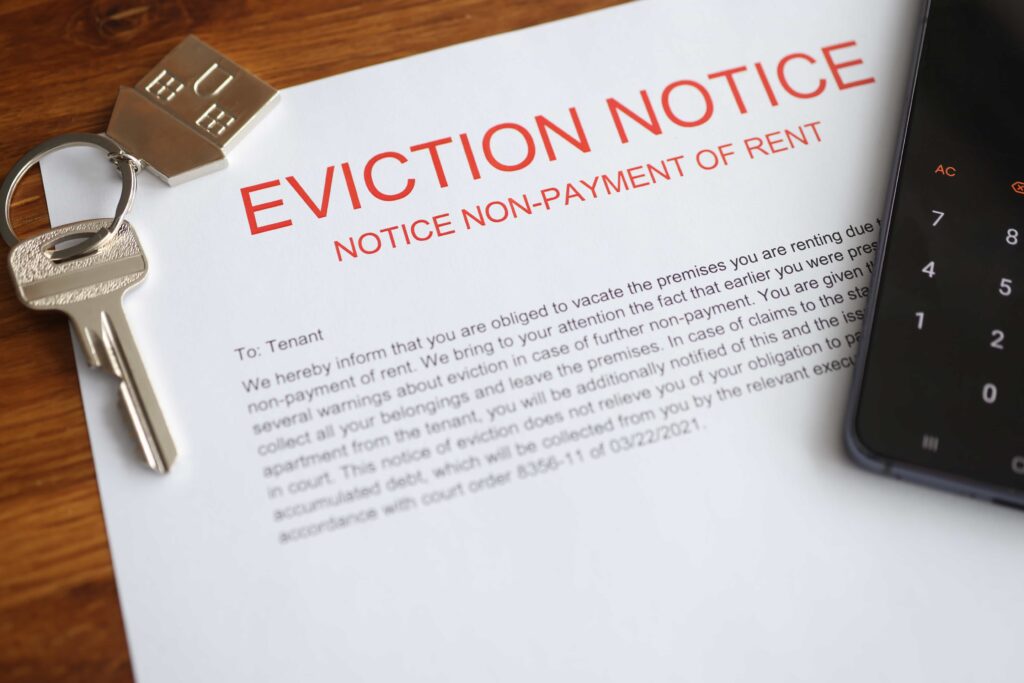Navigating the intricacies of tenant eviction can be a challenging task for both landlords and tenants in the affordable housing sector.
Landlords must adhere to specific legal procedures, while tenants need to know their rights to ensure a fair process. One crucial aspect of this process is the landlord giving notice to tenants.



In this blog, we’ll delve into the different types of notices landlords might need to give their tenants, the reasons for each notice, and the legal implications involved.
Types of Notices:
1. Notice to Pay Rent or Quit:
This notice is usually given when a renter is late with their rent payments. The notice reminds the renter that they have a set amount of time, often 3 to 5 days (excluding Saturdays, Sundays, and court holidays.) to pay the past-due rent, or they will be asked to leave the property. To get rid of a tenant who is not paying rent, the landlord may start the eviction process if the renter doesn’t cooperate.
2. Notice to Cure or Quit:
If a tenant breaks the lease terms by causing problems, or causes pet violations, or doing illegal activities, the landlord can give the notice to fix the issue or leave. This notice grants the tenant a chance to address the violation within a designated timeframe. If the tenant doesn’t address the issue, eviction proceedings may ensue.
3. Notice of Termination without Cause:
In a few cases, a landlord may want to end a tenancy without a specific tenant infraction. This can be the result of property improvements, modifications to how the property is used, or other commercial factors. Depending on state legislation, the required notice period may change, although it often runs from 30 to 90 days.
4. Notice of Termination with Cause:
If a tenant repeatedly makes late payments, causes property damage, or engages in criminal activities, or otherwise seriously violates the lease agreement, this notification will be given. The notice outlines the infractions and gives the tenant a set amount of time to leave. By state, the notice period may change.
5. Unconditional Quit Notice:
This notice is given to tenants only in case of extreme lease violation, such as engaging in illegal activities (e.g. selling drugs) or bringing in unauthorized tenants. This notice does not provide an opportunity for the tenant to rectify the problem but rather requires them to vacate the premises within 3 days (including weekends and court holidays).
It is important to note that this notice is only permitted in a few states, that too under specific guidelines.
6. Eviction Notice
The eviction notice is the final stage of the tenant’s eviction process, which informs the tenant about the court’s decisions, the reason for eviction, and the date by which they are supposed to vacate the property.
If a tenant refuses to leave, the landlord has the option to file a suit for eviction in district court and obtain an order.
Both landlords and tenants need to understand the eviction process and their rights to ensure a fair and peaceful resolution.
Legal Implications and Considerations:
1. State Laws and Regulations:
Notice requirements vary from state to state. It’s essential for both landlords and tenants to be familiar with their state’s laws regarding eviction notices. Some states might have additional protections for tenants in affordable housing.
2. Written Notice:
Notices should always be in writing and include specific details such as the reason for the notice, the date it was issued, the required action or remedy, and the consequences if the tenant fails to comply.
3. Delivery of Notice:
Proper delivery of the notice is crucial. Some states require notices to be hand-delivered to the tenant, while others allow mailing. The method of delivery may differ based on the state and type of notice. Proof of delivery, such as a signed acknowledgment or a certified mail receipt, should be retained.
4. Timeframes:
The notice period, or the time the tenant has to comply or vacate, varies based on the type of notice and state regulations. It’s important for both parties to be aware of these timeframes to ensure a fair and legal process.
5. Retaliation Protection:
Many states have laws protecting tenants from retaliatory eviction. This means landlords cannot evict a tenant for exercising their legal rights, such as reporting code violations or requesting repairs.
Tenant Resources and Rights:
Tenants residing in affordable housing have specific rights that ensure they are treated fairly throughout the eviction process:
1. Right to Receive Written Notice:
Tenants are entitled to receive written notice before any eviction proceedings. The notice should clearly state the reason for eviction and the required actions to avoid eviction.
2. Right to Remedies:
Tenants typically have the right to correct lease violations within the notice period. This might involve paying overdue rent, addressing disturbances, or rectifying other violations.
3. Right to Contest:
Tenants have the right to contest the eviction in court if they believe the notice was issued improperly or unfairly. Legal representation is crucial during this process.
4. Right to Due Process:
Regardless of the reason for eviction, tenants are entitled to due process, which includes a fair and lawful eviction procedure. Landlords must follow the appropriate legal steps, and tenants have the right to defend themselves.
End note:
So, the answer to the question “What notice do I have to give my tenant?” depends on the situation, and then choose from the different types of notices above.
Understanding the different types of notices, state-specific regulations, and legal implications is crucial for ensuring a fair and lawful eviction process.
For tenants, knowing their rights can empower them to contest wrongful evictions, and for landlords, adhering to the correct procedures can prevent legal complications down the road.
By fostering an environment of communication, respect, and adherence to the law, both parties can contribute to a more harmonious rental experience.




